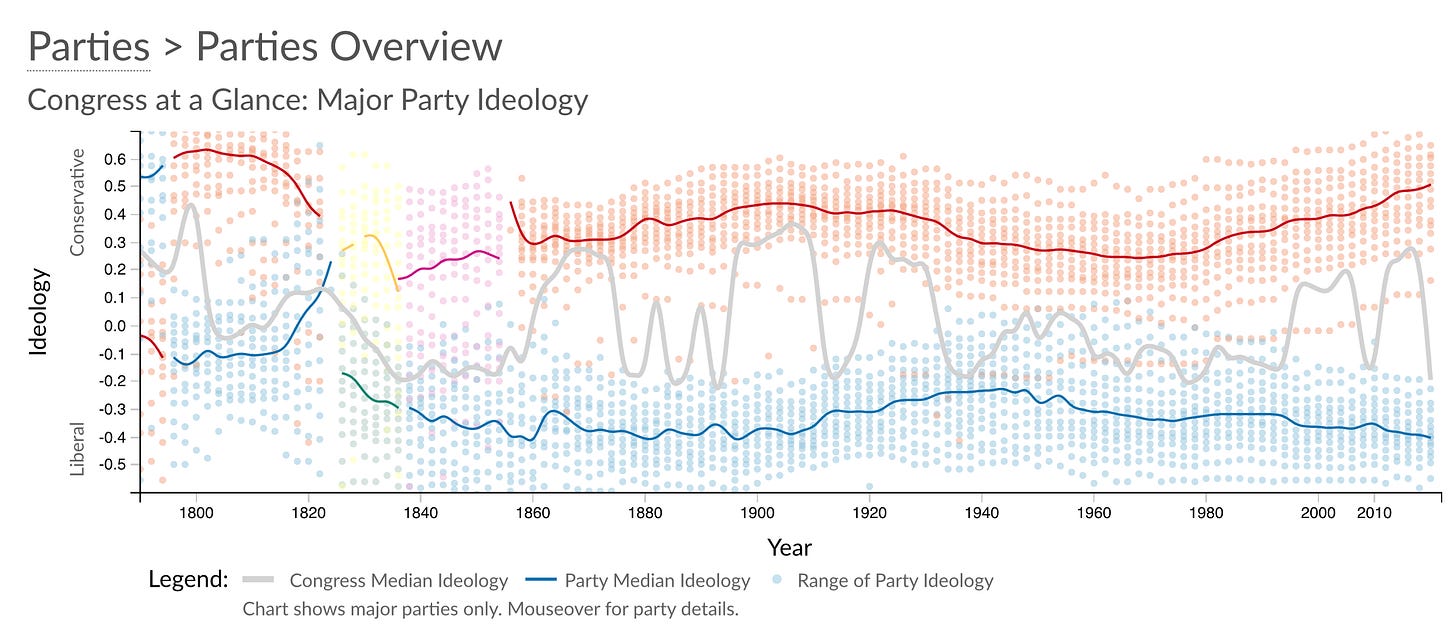Joe Biden’s hopeless embrace of bipartisanship
Ideological polarization has decreased shared partisan beliefs and increased the electoral punishment for cooperation
At a campaign stop in New Hampshire today, Joe Biden said he would consider asking a Republican to be his running mate next November. Here’s the quote, lifted from a CNN story:
Joe Biden told voters in New Hampshire on Monday that he would consider choosing a Republican as a running mate, but added, "I can't think of one right now."
Biden discussed the possibility after a woman told the former vice president that if he is the nominee, he will "have to pull out all the stops."
"Our 21-year-old son said the other night, 'I wonder if Joe Biden would consider choosing a Republican as a running mate," the woman added.
"The answer is I would, but I can't think of one now," Biden replied. "Let me explain that. You know there's some really decent Republicans that are out there still, but here's the problem right now ... they've got to step up."
It is not so surprising to hear from Biden, who frequently bemoans the lack of bipartisanship in Washington today. But I think it’s worth stating the obvious: Things aren’t like they were when you were first elected to the Senate, uncle Joe. It’s much harder today to “just get things done”.
I thought it would be useful to think through why.
For one, the parties today are much more ideologically polarized than they were in 1970. You can see that in this graph from VoteView.com, which shows the median ideology of each party’s members of congress over time. This polarization decreases the number of moderate “swing” senators and representative that cross party lines. Compared to 2019, the 1970s were practically the golden age for bipartisanship in Washington.

Partisan polarization not only makes cross-party agreement less likely, it also increases the electoral tax on cooperation. I theorize that such a tax scales with (a) the notoriety of the individuals and (b) the issues they are co-operating on. In other words, it is hard to imagine that an electorally vulnerable Republican politician would agree to cooperate with Biden on some issue (while they might be more willing to join forces with a little-known Senator). And it’s even harder to imagine they’d do so on a hot-button issue, like health care or wealth taxes (you know, the stuff people care about).
A final and preemptive consideration (because I know I’ll get about a million emails raising this issue) is that there’s a difference between what voters say they want and what they actually want. It’s true that Americans want a government that runs efficiently and produces “good” outcomes, but they also (a) disagree about what “good” means for particular issues and (b) disagree about what issues are important entirely! Voters want good governance, but they also want their side to win on the things they care about. That always brings some tension.
Joe Biden is no fool. He has tacked to the left on key policy positions, for example, in order to run a competitive campaign in the year of our lord 2019. But his ideas about how Washington should or can work today do appear foolish indeed. Perhaps the product of too much binging The West Wing on the old “No Malarkey” bus?
Editor’s note:
Thanks for reading my thoughts on this subject. And thanks for subscribing! Your membership adds up and makes all this newslettering possible (reminder: I do all this work independently). Please consider sharing online or with a friend; the more readers, the merrier!
As always, send me your tips about what you’d like to read about next, or your feedback otherwise. You can reach me via email at elliott@thecrosstab.com or @gelliottmorris on Twitter.
—Elliott



